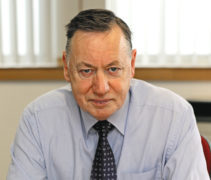In August 2018, I was astounded to read the news that former first minister Alex Salmond had been accused of sexual misconduct during his time in office.
The civil service had changed their rules on these matters, and two allegations from civil servants had been made. I was shocked because for three years I had been a senior special adviser – a Spad as they’re known in political circles – firstly to Mr Salmond, then his successor Nicola Sturgeon.
And for 14 years before joining the Scottish Government, I’d been political editor of The Sunday Post, working closely with MSPs of all parties at Holyrood and MPs at Westminster.
In all that time, there had never been the slightest inkling of allegations of that nature linked to Alex Salmond. There were rumours about many politicians of course, of excessive drinking, of affairs, and other activities unbecoming of public servants. None ever related to Mr Salmond. The only story we ever heard about him was that he liked a flutter on the horses.
He engendered loyalty in his staff. On hearing the news, despite the fact that I had retired from government two years previously, I called him on his mobile, but the call went to voicemail. I left a message saying that if there was anything I could do to help he could call me. Minutes later, he did call back, and asked if I would handle the expected deluge of media calls which he now expected. I readily agreed, and for the succeeding months, it took over my life.
The accusations had emerged after changes were made to civil service complaints procedures which had then been backdated. It seemed to me that this was wrong. You can’t change a rule or a law and backdate it so that things which had been acceptable or had been arbitrated under a previous system could now be reconsidered. This was also Mr Salmond’s view, and he took the matter to judicial review.
The wheels of justice run very slowly, and it wasn’t until January 2019 that the Court of Session found the civil service action had been “unlawful, unfair, and tainted by apparent bias”. That was the end of my own direct involvement in the case. However, as the Scottish Government had passed on the complaints to the police, a parallel criminal investigation had begun, the result of which was been the trial which ended yesterday.
I have always admired Mr Salmond and my relationship with him goes back several decades. I first knew him when I was a news reporter in Edinburgh, and he was an up-and-coming politician based in Linlithgow. When the Scottish Parliament was established in 1999 and I was appointed political editor, Mr Salmond was leader of the opposition, and an invaluable source of stories. He could be irascible, but always approachable.
When I was nearing retirement from the Post, he called me up to the first minister’s office at Holyrood. I thought it was simply to congratulate me on my long career, only to discover he was offering me a job. It was no secret that I supported Scottish independence and the SNP, so I was delighted to accept.
Much has been made of Mr Salmond’s temper. But if you were on the receiving end, you probably deserved it. If Mr Salmond was to be interviewed on BBC Scotland, usually just after 8am, that meant getting to Bute House for 7am, going through day’s papers and media and briefing the FM on anything of importance. We got hell if the interviewer asked something which the FM hadn’t been briefed about.
Much has been made about late-night dinners in Bute House, but these were work events, often after a 16-hour intensely pressurised day. He did enjoy a single malt, but never in all the years I’ve known him did I ever see him the worse for drink.
He loved intellectual sparring. I sat beside him at a civil service briefing before a summer cabinet to be held in the west Highlands. As an aside, he mentioned puffers, and started firing questions at me about the crew of the Vital Spark. “What was the mate’s name? Who was the engineer?” he asked, as the civil servants looked on in bewilderment. He loved everything to do with Scotland and its history.
If you happened to be the weekend duty Spad, you could expect a later night call on Friday to check what media calls had been made, on Saturday morning another call to go through the morning papers, at least another two calls on Saturday, and the same on Sunday. It was a high-pressure, high-stress job, but one which I wouldn’t have missed for the world.
Now that Mr Salmond has been cleared of all charges, the political repercussions will begin. Lots of evidence wasn’t heard during the trial, evidence which I have no doubt Mr Salmond will now put in the public domain. Some individuals within the Scottish Government and the civil service face an uneasy future today.
I am sure I’m not alone in looking forward to hearing his voice again.

